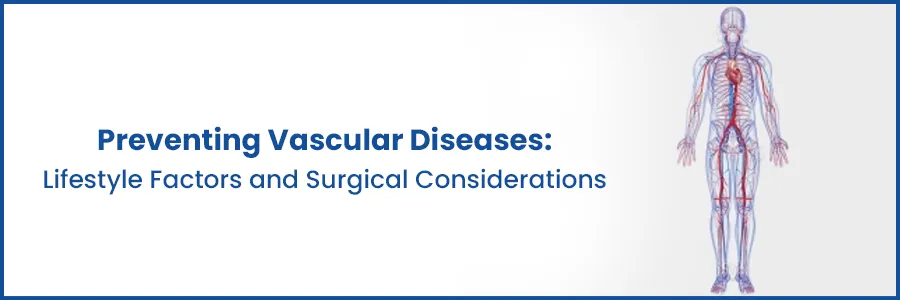- Cardiology 84
- Dermatology 45
- Endocrinology 33
- ENT 16
- Fertility 190
- Gastroenterology 78
- General-Medicine 81
- Gynecology 80
- Hematology 19
- Infectious-Diseases 33
- Neurology 52
- Oncology 34
- Ophthalmology 23
- Orthopedics 69
- Pediatrics 31
- Procedure 23
- Public-Health 144
- Pulmonology 59
- Radiology 8
- Urology 68
- Wellness 161
- Woman-and-child 77

Vascular Diseases and Lifestyle Changes
Vascular health is fundamental to overall well-being, impacting every facet of our lives. However, amidst the hustle and bustle of modern life, we often neglect the critical role our blood vessels play. In this comprehensive blog, we explore the intricate relationship between lifestyle factors and surgical considerations in preventing vascular diseases. From daily habits to advanced medical interventions, discover how to safeguard your vascular health for a vibrant life.
What are Vascular Diseases?
Vascular diseases refer to conditions affecting blood vessels, including arteries and veins. These diseases encompass a wide range of issues, from atherosclerosis and aneurysms to deep vein thrombosis (DVT) and varicose veins. They can lead to serious consequences if left untreated but are largely preventable with proactive measures and medical guidance.
Cardiovascular Diseases: A Major Component
Cardiovascular diseases are a subset of vascular diseases that specifically affect the heart and blood vessels. They include coronary artery disease, heart attacks, and heart failure. Managing cardiovascular health involves lifestyle changes, medication, and sometimes surgical interventions to prevent complications and maintain heart function.
Peripheral Vascular Diseases: Understanding the Impact
Peripheral vascular diseases affect blood vessels outside the heart and brain, particularly those supplying the limbs. Conditions like peripheral artery disease (PAD) and varicose veins fall under this category. Effective management often involves lifestyle modifications, medications, and in some cases, surgical treatments to restore blood flow and alleviate symptoms.
Lifestyle Factors: Building a Foundation of Vascular Health
- Balanced Nutrition for Healthy Arteries: Explore how a diet rich in antioxidants, fibre, and heart-healthy fats supports optimal blood vessel function, reduces inflammation, and maintains healthy cholesterol levels.
- Active Living, Strong Circulation: Delve into the benefits of regular physical activity for promoting healthy blood flow, preventing obesity, and maintaining vascular elasticity.
- Say No to Smoking: Learn about the harmful effects of smoking on blood vessels and discover how quitting can significantly reduce vascular disease risk.
- Stress Management and Vascular Resilience: Understand the link between chronic stress and vascular health and explore stress-relief techniques that support strong blood vessels.
- Blood Pressure Control: Learn the importance of monitoring and managing blood pressure and make lifestyle adjustments to maintain healthy levels.
- Weight Management for Vascular Wellness: Explore the connection between excess weight and vascular diseases and find sustainable strategies for achieving and maintaining a healthy weight.
Surgical Considerations: Advanced Interventions for Prevention
- Endovascular Procedures for Aneurysm Prevention: Learn about minimally invasive techniques like endovascular repair to prevent aneurysm ruptures and complications.
- Carotid Artery Surgery: Explore surgical interventions to minimize stroke risk by removing plaque and restoring optimal blood flow to the brain.
- Peripheral Artery Disease (PAD) Management: Discover surgical options such as angioplasty and stent placement to restore blood flow and prevent complications in PAD patients.
- Varicose Vein Treatment and Prevention: Understand surgical and non-surgical methods for addressing varicose veins, improving venous circulation, and easing discomfort.
Your health is everything - prioritize your well-being today.
Schedule Your AppointmentMeet Our Trusted Vascular Surgeon
Ready to prioritize lifelong vascular health? Consult our experienced vascular specialists at Medicover Hospital to create a personalized prevention plan and explore advanced interventions tailored to your needs.
Conclusion
Preventing vascular diseases requires a collaborative effort involving individuals, healthcare professionals, and advanced medical interventions. By adopting a lifestyle that prioritizes vascular wellness and staying informed about surgical options, you empower yourself to manage your vascular health effectively and enjoy vitality and longevity.
Frequently Asked Questions
Vascular diseases affect blood vessels and can lead to serious complications like heart attacks, strokes, and aneurysms. Prevention is crucial to decrease the risk of these conditions and maintain overall health.
Lifestyle factors like diet, physical activity, and smoking play an important role in maintaining healthy blood vessels. Making positive lifestyle choices can promote optimal blood flow and reduce the risk of vascular diseases.
Absolutely. Proper balanced diet rich in fruits, vegetables, whole grains, and lean proteins can help manage cholesterol levels, reduce inflammation, and support the health of blood vessels.
Yes, regular physical activity improves blood circulation, helps maintain a healthy weight & reduces the risk of conditions like atherosclerosis and peripheral artery disease.
Smoking damages blood vessels, increasing the risk of atherosclerosis and blood clots. Quitting smoking is one of the most effective ways to protect vascular health.
Chronic stress can contribute to high blood pressure and inflammation, negatively affecting blood vessels. Stress management techniques can support vascular wellness.
Maintaining a healthy weight is crucial for vascular health. Excess weight can strain blood vessels and increase the risk of conditions like hypertension and diabetes.
Surgical procedures, such as endovascular repair for aneurysms and carotid artery surgery, can address existing issues and prevent serious complications like ruptures and strokes.
Individuals with varicose veins, especially if they cause discomfort or affect daily life, should consider treatment to improve venous circulation and prevent potential complications.
While lifestyle changes and surgical interventions can significantly reduce the risk of vascular diseases, some factors, like genetics, may still contribute. However, taking proactive steps can greatly improve overall vascular health.

- Cardiology
- Case Studies
- Dermatology
- Endocrinology
- ENT
- Fertility
- Gastroenterology
- General
- General-Medicine
- Gynecology
- Hematology
- Infectious-Diseases
- Medical News
- Neurology
- Oncology
- Ophthalmology
- Orthopedics
- Pediatrics
- Procedure
- Public-Health
- Pulmonology
- Radiology
- Second Opinion
- Urology
- Wellness
- Woman-and-child